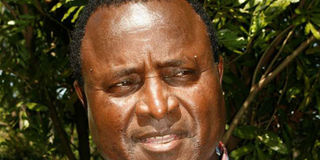Ex-MP Zebedeo Opore benefits from Raila Odinga's petition

Former Bonchari MP Zebedeo Opore. His request for the forms drew a blank before he moved to court. PHOTO | FILE | NATION MEDIA GROUP
What you need to know:
- In his ruling, Justice John Mativo said the right to information forms part of human rights and freedoms, and it is essential to be able to access information from public authorities.
“Right to information laws and policies create mechanisms whereby an individual can access information that may have an impact on them, in order to meaningfully exercise other rights in the Bill of Rights,” he said.
The judge added that IEBC failed to convince him that the information sought falls within documents that should be restricted.
A former MP has successfully argued to be granted access to information by the electoral commission using a precedence set by the Supreme Court in the case filed by National Super Alliance leader Raila Odinga.
Former Bonchari MP Zebedeo Opore moved to the High Court and successfully argued to be supplied with a list of voters identified by the electronic voter identification devices at every polling station, copies of Forms 32A (voter identification and verification forms) at every polling station and polling station diaries, as prepared and submitted by the respective presiding officers.
ARTICLE 35
Although the Independent Electoral and Boundaries Commission (IEBC) objected the application, Mr Opore further invoked Article 35 of the Constitution on the right to information.
The former MP has since filed a petition seeking the nullification of Mr John Oroo Oyoika’s win.
Mr Oroo won the parliamentary seat on of People’s Democratic Party ticket while Mr Opore sought to defend his former seat on a Jubilee Party ticket.
Mr Opore had first written to IEBC seeking to be supplied with the said information but it drew a blank yet time was running out for him to lodge the petition.
Challenging the election of an MP requires the disgruntled party to file the petition within 28 days of the declaration of the results.
RAILA CASE
During the hearing before the Supreme Court, Mr Odinga successfully sought to be supplied with a number of documents and kits, which were used during the August 8 General Election.
In a unanimous decision, judges of the apex court allowed the application, although in some instances, the parties were allowed read-only access.
The exercise was supervised by Supreme Court Registrar Esther Nyaiyaki.
A report compiled by Ms Nyaiyaki became the turning point in the presidential election petition as damning evidence was unearthed pointing out inconsistencies and irregularities committed by IEBC officials.
By a majority decision, the judges, led by Chief Justice David Maraga, nullified the election and ordered a repeat of the presidential poll within 60 days.
'CONFIDENTIAL'
IEBC has set October 17 date for the repeat of the poll.
Before the High Court, Mr Opore told the court that he wrote a letter to IEBC on August 23, 2017, requesting records and documents in their custody and control pertaining the elections for Bonchari parliamentary seat.
The electoral agency admitted in court that it received the request but argued that the former legislator had copies of various statutory forms that were used during the elections, which include forms 35A and 35B of all the polling stations in the constituency.
The electoral agency said Mr Opore could be granted the information he sought because the documents he was seeking were confidential and for private use by the commission.
BREACH
In his ruling, Justice John Mativo said the right to information forms part of human rights and freedoms, and it is essential to be able to access information from public authorities in order to exercise individual human rights and freedoms.
“Right to information laws and policies create mechanisms whereby an individual can access information that may have an impact on them, in order to meaningfully exercise other rights in the Bill of Rights,” he said.
The judge added that IEBC failed to convince him that the information sought falls within documents that should be restricted.
He said denying Mr Opore information, which he required for enforcement of a constitutional right, in was a gross violation of the Constitution and a breach of his fundamental rights under Article 35.
The judge directed the IEBC to provide Mr Opore with documents he had sought.



